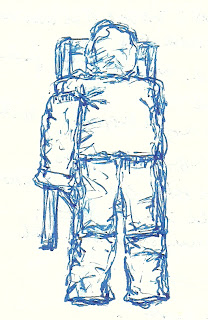'The Chair Plays' review or 'This dummy needs more stuffing.'
'The
Chair Plays', Edward Bond
Lyric
Theatre, Wednesday 25th April 2012
Written
for Culture Wars
Edward
Bond is notoriously dismissive of critics, which makes it tough to
review his plays – particularly his later, trickier works. I can
almost hear him hissing in my ear, as I write: 'Philistine! Ingrate!
Fool!' 'The Chair Plays', never performed in England until now, feel
like a critical challenge. Bond has reduced his writing to its
starkest elements and it's as if he's waiting, hoping for us to call his
bluff and declare his words, naked and bare. Well, I accept your
challenge, Mr Bond: 'The Chair Plays', as ambitious as they might,
left me shaken but not stirred.
The
main billing – 'Chair' – is yet to come. That's fortunate, since
'For Have I None' and 'The Under Room' run at three hours, as it is.
Both are set in the future; a time when the streets stream with
blood, mass suicides run riot and officials rule the roost. All this
ugly chaos unfurls outside the houses, in which these two plays are
set. Inside, all is tense, still - and heaving with symbolism.
'For
Have I None' kicks off with a petrified lady, Sara, flinching with
each knock at the door. Each time she opens the door, she is
presented with endless black. Her husband, Jams, arrives home and he
cannot hear these haunting knocks. The Biblical overtones simmer
sinisterly: 'Ask, and it will be given to you; seek, and you will
find; knock, and it will be opened to you.' But this is a godless
world that Sara and Jams inhabit and, instead of welcoming in Jesus,
they eventually let in a young chap who has fled a massive suicide.
He claims to be Sara's brother but sibling ties don't exist in this
black, rootless landscape and Sara is unconvinced.
The
opening scenes, directed with a thankful lack of ceremony by Sean
Holmes, jangle quite nicely. The stage space becomes filled with
weird gaps. It's a world where the senses have turned senseless;
although Sara and Jams talk, jaggedly, they do not connect and
although there's a hellish meltdown raging outside, life inside
screeches on like normal. .
But
one yearns for the play to open out and for Bond to grant us access
to that shadowy, hollow landscape outside. Instead, Bond devotes much
of his play to simple, marital squabbling. Sure, the nature of the
argument may be pointed and bizarre – the husband and wife fight
fiercely about who sits in which chair – but the dynamic remains
familiar. Despite all the hazy danger that seeps under the door,
inside feels safe and even a touch predictable.
Aidan
Kelly's character – the ruthless officer – is the only one
connected to the rotten heart of this play and his performance is the
most intense. It's frightening to watch him chomp on mashed potatoes,
as he describes a whole town marching towards death. Naomi
Frederick's role is much trickier and she struggles. All the heavy
symbolism lurking in this play is laid at her feet. As she repeatedly
jolts at those phantom knocks, her character start to feel like an
exercise.
There
is a baffling scene, deep into the play, when Sara (Frederick) enters
the room, decked in a sky-blue cloak, covered in spoons. Frankly, she
looks absurd. She also sounds ridiculous, as spoons jangle with her
every step. Sara later turns her coat inside out, to reveal a
tapestry of bones. It's such a forced, false and wasted moment.
There's still a dangerous, glittering energy to this play – it's a
world, which could see any manner of horrors crawl through that door
and tear up the stage. The fact the door reveals a girl decked in
spoons is hard to stomach.
'The
Under Room' is even more pared down and is directed by Bond at a
grating, glacial pace. It takes place in a cellar, where an illegal
immigrant is taking refuge from the police, swarming outside. With
his entry, the immigrant (Felix Scott) picks up a white dummy and
places it on a chair. For almost the entire play, the other actors
talk to this dummy, whilst Scott speaks out to the audience. The
symbolism feels so pointed that it actually blunts itself. Yes, we
get that this immigrant has lost his identity. We understand that he
now functions in a world that does not understand him and can barely
even see him. But is that enough to hang a whole play on?
It
all feels frustratingly and wilfully dry. Bond's desire to write a
highly stylised and starkly symbolic piece has ripped the guts out of
his writing. 'The Under Room' never throbs with the kind of thick
danger that wraps its way around his other, better and meatier plays.
Instead, this feels like a skeletal piece, the characters as wispy
and blank as the dummy that sits amidst them.
There
are still some incredible moments of icy lyricism, when Bond forgets
to restrain himself and lets his writing free. There is a brilliant
monologue, in which the immigrant recalls the murder of his parents.
'I vomit my laughter', he says, as he describes a blade sliding into
his mother or father: 'The knife throb because the heart is
beating'. This is what Bond does so bloody well: that ugly,
mesmerising combination of love and destruction, which slices right
through you and leaves you gasping for air.



Comments
Post a Comment